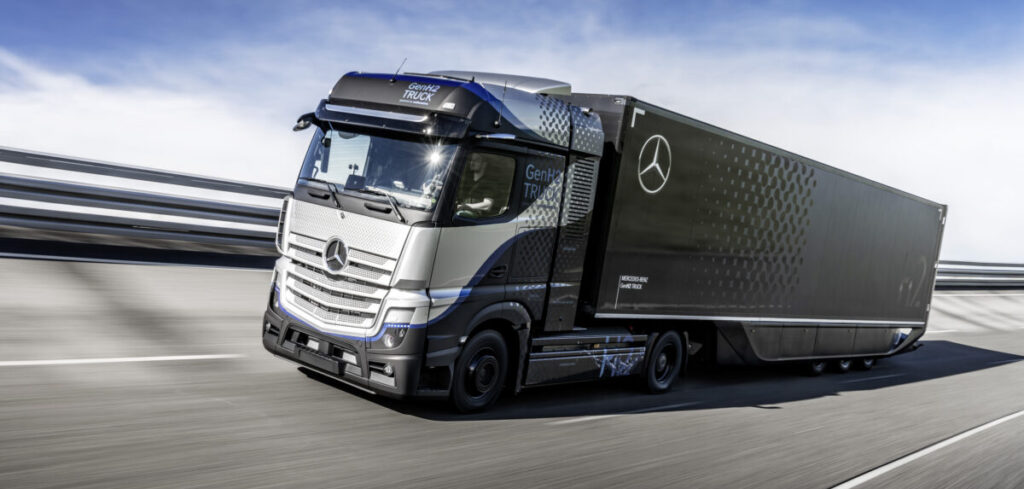Daimler Trucks says it is to focus on hydrogen-powered fuel-cells for the electrification of its vehicles, as it aims to provide clean, long-haul transport. The company has set a goal to achieve a range of more than 1,000km without refueling.
In April of this year, the truck manufacturer began to conduct rigorous tests on the first new ‘enhanced’ prototype of its GenH2 Truck, putting the fuel-cell vehicle through its paces in an extensive set of tests, focusing on continuous operation and vehicle behavior in a range of weather and road conditions while carrying out various driving maneuvers.
Daimler states that the truck will be tested on public roads this year, with customer trials to begin in 2023. By 2027, the first GenH2 Trucks are expected to be handed to customers.
“We are consistently pursuing our technology strategy for the electrification of our trucks,” commented Martin Daum, chairman of the board of management of Daimler Truck and member of the board of management of Daimler. “We want to offer our customers the best locally CO2 -neutral trucks — powered by either batteries or hydrogen-based fuel-cells, depending on the use case. We’re right on schedule and I’m delighted that the rigorous tests of the GenH2 Truck have started successfully.”
“The hydrogen-powered fuel-cell drive will become indispensable for CO2-neutral long-haul road transport in the future,” continued Daum. “This is also confirmed by our many partners with whom we are working together at full steam to put this technology on the road in series-production vehicles. Moreover, considerable momentum is being generated by the clear commitment of national and European regulators to the use of hydrogen for road freight transport. Political support plays an important role in promoting the creation of an infrastructure for green hydrogen and making an economically viable use of fuel-cell trucks possible for our customers.”
Development engineers want the GenH2 Truck to meet the same durability requirements as the IC-engined Mercedes-Benz Actros, equating to 1,200,000km of running, over a 10-year period, equating to 25,000 operating hours. Over the past weeks, the GenH2 has been subjected to hundreds of kilometers of testing under constant load on a road-to-rig test stand. During the tests, extreme situations were simulated that the end vehicle may face in the real-world such as emergency braking.
With a completely new design, the GenH2 features a host of new components, including parts in the fuel-cell system, the all-electric powertrain, and its associated systems such as the cooling unit. Due to the new components’ weight and position being different to previous iterations of the vehicle, engineers have also concentrated on the truck’s handling properties during tests.
With extensive data and information needed early in the test loop, the current GenH2 prototype has been loaded with a 25-metric ton payload during tests, equating to a gross vehicle weight of around 40 metric tons, identical to specifications planned for the series-produced variant of truck.
The Daimler Truck is set to run on liquid hydrogen due to its higher volumetric energy density compared with gaseous hydrogen. Development of the tank technology for the liquid hydrogen system is currently underway, and by the end of 2021, engineers plan to use the prototype tank system for future and on-going tests. Until this point, testing of the GenH2 Truck will use gaseous hydrogen tank system. Daimler Trucks says it aims to demonstrate that both options can be technically implemented.


